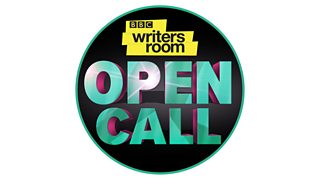Our Open Call window for script submissions is open from 12 noon on Thursday 9th December 2021 to 12 noon on Thursday 13th January 2022. Get some top tips including Dos and Don'ts before you submit your script.
Do you have any questions about the Open Call? Join us for one of our drop-in sessions beginning Tuesday 7th December and running throughout the submission window.
Open Call
- Find out full details including
- Terms and Conditions and
- FAQs
Read a blog post by Jess Loveland the Head of New Writing for 主播大秀 Writersroom and 主播大秀 Drama Commissioning in which she explains the changes to this year's Open Call (previously Script Room) including how it will offer more opportunities for writers. Jess also responds to questions on video. Please read and watch this before emailing us as your question may have already been answered.
Read a blog post by Jess Loveland where she explains more about the additional questions that you'll be asked when submitting your script and the kind of information that we are looking for.
In our Open Call we accept Drama and Comedy/Drama scripts. But what is Comedy/Drama? Here are two recent blog posts which help to define the genre:
As part of your submission you must include a Logline.
More advice and resources are available on our website including:
- Scriptwriting Essentials - from Developing Your Idea to Rewriting watch 8 short animations
- The Perfect 10 - from our former Development Producer Paul Ashton
- John Yorke's 10 Questions that every writer should ask of their script
- Script Templates
- Read Scripts from many 主播大秀 shows in our Script Library
Be Inspired by writers including Russell T Davies, Abi Morgan, Sally Wainwright, Sarah Phelps, Kay Mellor, Jed Mercurio and many many more

Some basic Dos and Don’ts to give your script the best chance of being selected
- Don’t leave it to the last minute to submit. Technical glitches, internet problems or not having all the information you need to hand may mean you miss the deadline.
- Do read the guidelines on to how to submit before starting the submission process. It will save you a lot of time and potential stress. Remember that in this Open Call we are asking for a little more information than before so your entry will take longer. Find out more on this blog post
- Don’t send your first draft. It’s a massive achievement to finish a script and the temptation to simply breathe a huge sigh of relief, hit send and go to the pub is totally understandable. But it might be better to put it aside for a week or two, let it gestate, and return to it with fresh eyes. You might even find that a break away from it will inspire some new ideas and fresh angles.
- Do try to make a good first impression. Format your script properly and check for typos and spelling mistakes. Although a script would never be turned down due to typos, spelling mistakes or incorrect formatting it is always worth making it the best it can be. A professionally finished and correctly formatted script is always a pleasure to read, especially when dealing with the volume of scripts we are reading. Readers are humans too, remember.
- Do ensure that your story starts with a strong opening and hooks the audience interest as early as possible. The first 10 pages are crucial. Ideally, the first few pages will ask an intriguing question that makes us want to find out what happens next. That said, be wary of using a teaser as a ‘quick fix’. Teasers are in danger of becoming overused and can therefore have the opposite effect to the one intended.
- Don’t overload your opening pages with too much unnecessary detail about setting and characters. Trust that your audience will figure things out for themselves and do not need to be spoon fed information.
- Don’t down tools the moment you get to page 30 just because the minimum length required is 30 pages. An abrupt ending can be as disappointing as an overly pedantic start. Similarly, don’t make your script too long – does your story really need to be longer than 100 pages or can you cover the same ground in a more concise way?
- Do try to avoid familiar tropes. For example, do you really need start your script at the beginning of the day with your main character being woken up by an alarm clock? And on arrival at a crime scene do detectives always have snarl “What have we got?”
- Do set aside some time to work on your logline before you submit. It is incredibly useful for the readers to see where your story is going, especially at the 10 page stage. Loglines are also a very useful tool for writers themselves to check that the story has clarity, the protagonist has a compelling purpose and that this need is driving the narrative.
(We'll post the recording of our webinar event on 2nd December at the top of this page as soon as possible after the event.)
